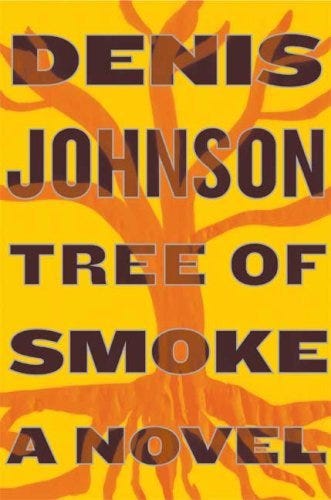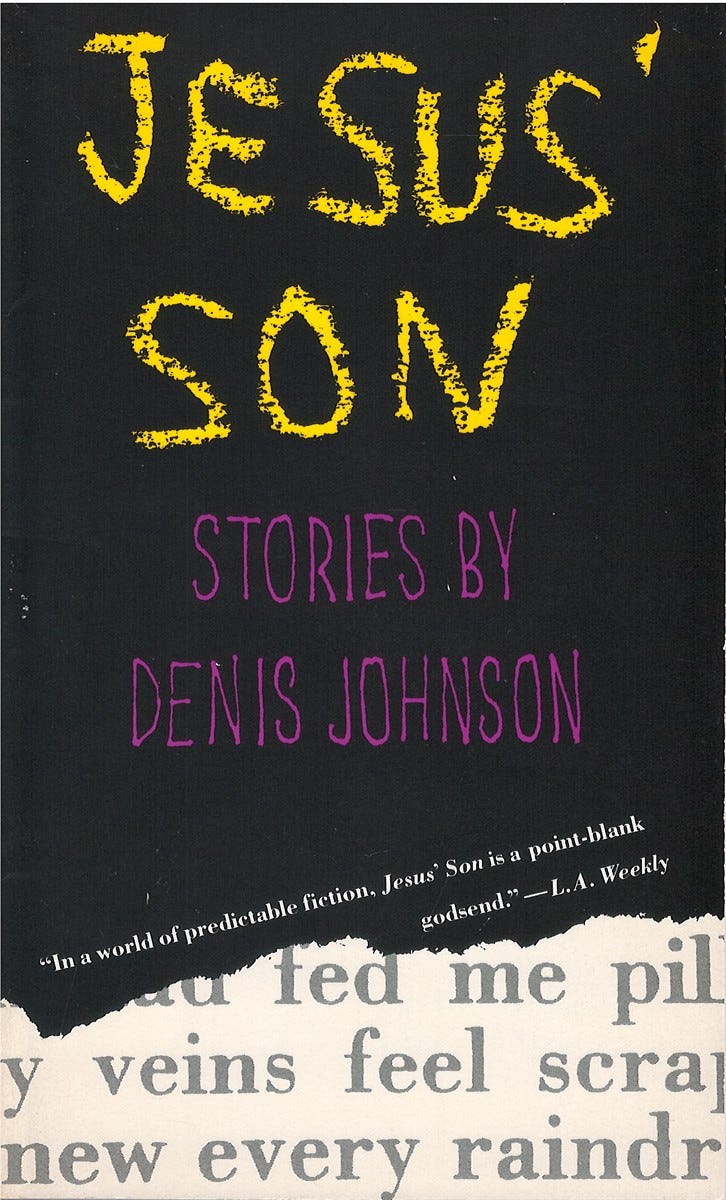Recently, I read (by audio) Tree of Smoke (2007) by Denis Johnson (1949-2017). I had a copy of this back in the day, started it, couldn’t get into it. My experience this time was much different.
Yes, like most people, I came to Johnson via his hallucinatory short story collection Jesus’ Son (1992), published the year I completed my undergrad, though it didn’t cross my path until 2006, over a decade later. Strange that it took that long, but true.
In 2006, for The Danforth Review, the lit mag I started and edited, I asked a number of writers to suggest titles/stories they would place on a “Short Story 101” syllabus. Denis Johnson came up three times. I must read this, I thought.
I have read a number of Johnson titles since then, but I haven’t written about any of them, except this three word review on Goodreads for Angels (1983): “Oh boy. Wow.”
Rachel Kushner includes a brilliant summary of Johnson in her essay collection, The Hard Crowd (2021). I will give a far less brilliant summary here of the Johnson books I’ve read or poked into:
Angels (1983)
Jesus’ Son (1992)
Train Dreams (2002)
Tree of Smoke (2007)
I have a hard time comprehending how Denis failed to cross my radar before 2006, before that TDR feature, but so it goes.
I’m going to tackle the short critiques first. Despite writing, “Oh boy. Wow,” I don’t remember much about Angels. In my mind it blurs with Richard Ford’s The Ultimate Good Luck (1981). Two books from a similar era, responding to similar cultural pressures. Coming to terms with America, post-70s, post-60s counterculture crash. Two white heteronormative dudes. I mean, I thought they were great, but the specifics haven’t stuck.
Regarding Train Dreams, I think I read 10 pages.
The idea of Seek: Reports from the Edges of America & Beyond excited me. I read about half of it. Yes, I heard echoes of Hunter S. Thompson (Fear and Loathing in Los Vegas (1971)) and Henry Miller (The Air-Conditioned Nightmare (1945)). Another journey through the American Berserk, I thought (which, incidentally, didn’t start in 2016).
I had in mind that “American Berserk” came from Philip Roth’s essay, “Writing American Fiction” from Reading Myself and Others (1975) [originally a speech at Stanford, 1960]. In that essay/speech, Roth begins by telling the story of a grisly murder in Chicago that held the public’s attention. It played out over days in the press. As a narrative, it revealed layers and layers. How can the American novelist compete with the American Berserk thrown up daily in our social media feeds tabloids?
Except that’s not what he says, exactly. What he writes is:
The actuality is continually outdoing our talents, and the culture tosses up figures almost daily that are the envy of any novelist.
The mind hovers over the word “almost.” LOL.
The American Berserk is Rothian, though. It comes from his novel, American Pastoral (1997), I found after asking Mr. Google:
The daughter who transports him out of the longed-for American pastoral and into everything that is its antithesis and its enemy, into the fury, the violence, and the desperation of the counterpastoral—into the indigenous American berserk.
In any case, I was keen to take a ride on Johnson’s trip through the American Berserk. I’ve read about half the book so far.
I read The Largesse of the Sea Maiden in hard cover, shortly after it came out, but that was in the quiet years, when I was withdrawing heavily, still trying to process the grief arising from the death of my wife in 2012 and all of the chaos that followed. Don’t ask me anything about this book. I don’t remember any of it, except I appreciated it. Might be time to pick it up again. My memory is better now.
So, okay. Jesus’ Son. Like apparently many others, this book reordered my mind. The scene in the hospital is imprinted on the back of my mind like a prehistoric cave drawing. This book is the literary equivalent of Springsteen’s Nebraska (1982), stripped back, down to the core, earth quivering. Essential.
Which brings us to Tree of Smoke.
I enjoyed it. I appreciated it. I admired it. After finishing it, I looked it up. It won many awards. Most interesting to me was, I found a link on Wikipedia to a real hateful review in The Atlantic (Dec 2007) by B.R. Myers (the hateful ones are always more fun, no?): “It’s the most critically acclaimed novel of the fall. And it’s astonishingly bad.”
Denis Johnson is, in short, the sort of novelist whose work one expects to be reviewed on the cover of every prominent newspaper’s book section, as Tree of Smoke was in September. Equally predictable was the reviewers’ implicit injunction that we should ask not what the book can do for us, but what it can do for Johnson’s place in American letters. This much is standard Important Writer treatment, and for all I know, Michiko Kakutani (The New York Times), Jim Lewis (The New York Times Book Review), and other reviewers consider Johnson worthy of it no matter what he puts out. What I find difficult to believe is that they admire Tree of Smoke. For one thing, their own prose is better than anything in it.
Oh boy. Wow.
I mean, Myers is right when he says Tree of Smoke relies on previous narratives. It’s a a bit Joseph Conrad, a bit Graham Greene, a bit Don DeLillo. Maybe even a bit Philip Roth, a bit of Francis Ford Coppola, a bit of Pynchon. The American Berserk is infused on every page, but why wouldn’t it be. The backdrop is the Vietnam War. It tells, in part, the pre-story of Bill Houston, protagonist of Johnson’ first novel, Angels. But it tells many other stories, too.
Here is a portrait of America, filtered through 20th century modernism, High and post-. It is large, ambitious, dark, satirical, heavy with pathos, challenging the tabloids and the social media feeds — to tell a truth, assert a level of meaning that Tik Tok can only dream of (if androids had dreams).
Roth asked in 1960 if novelists can keep up with the tabloids. In our current batshit crazy, what can Art do? Tree of Smoke was a bit shot at tackling the actuality. I think Rachel Kushner does a great job of it, too. Douglas Glover’s challenge to remember the carnivalesque nature of language / the real stays with me perpetually also.
A big theme in Tree of Smoke, actually, is communication (and information). Some of the characters are early CIA plants in Vietnam. They try to make sense of things and also try to insert sense into things. What is real, baby, and what is not. The conversations get more than a bit theoretical, but to a former rhetoric student it was all fascinating. Myers hated it, of course.
Tree of Smoke was long, but it hit me like Jesus’ Son. Right between the eyes.



